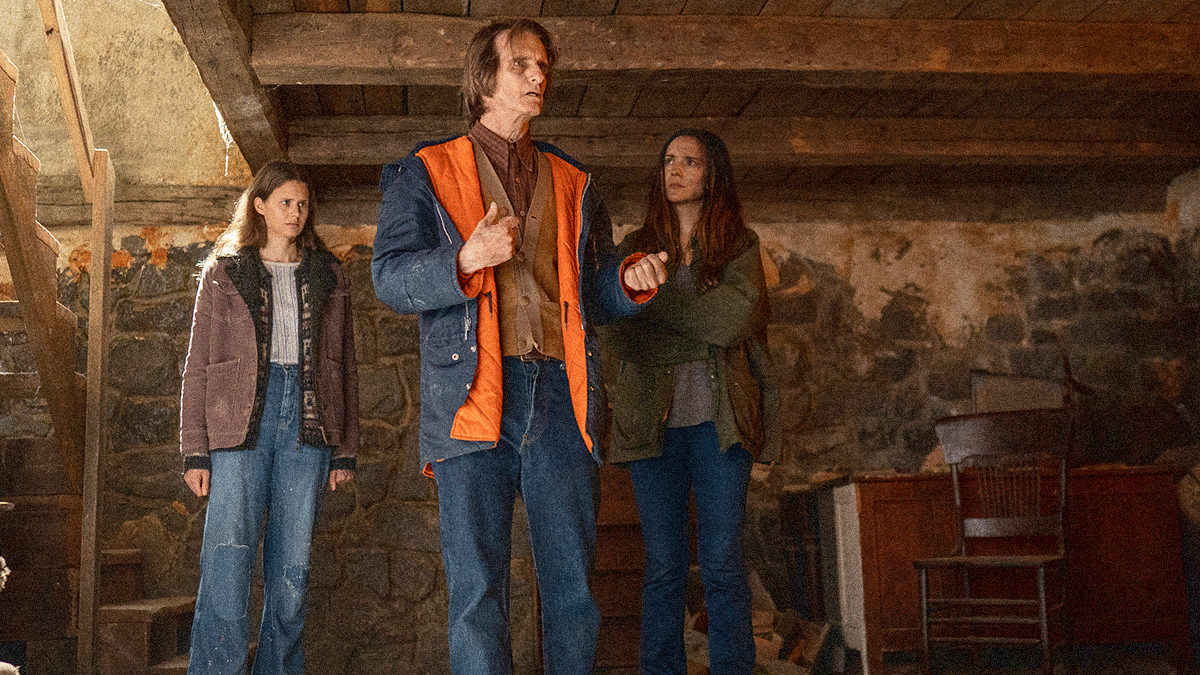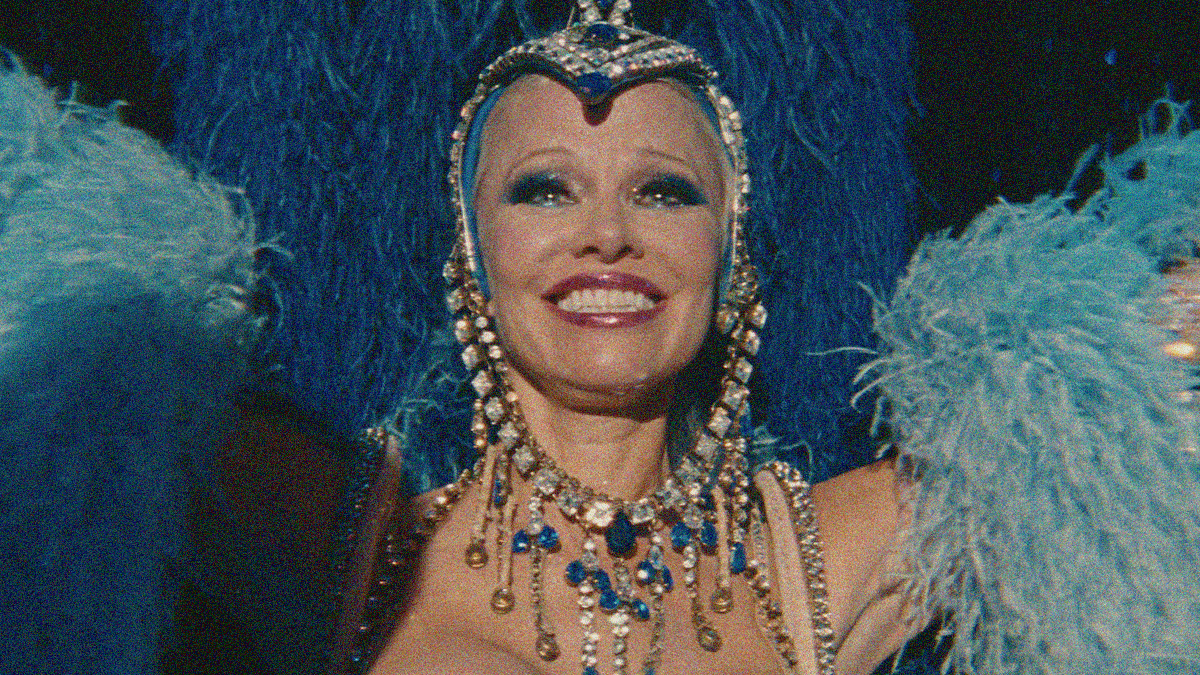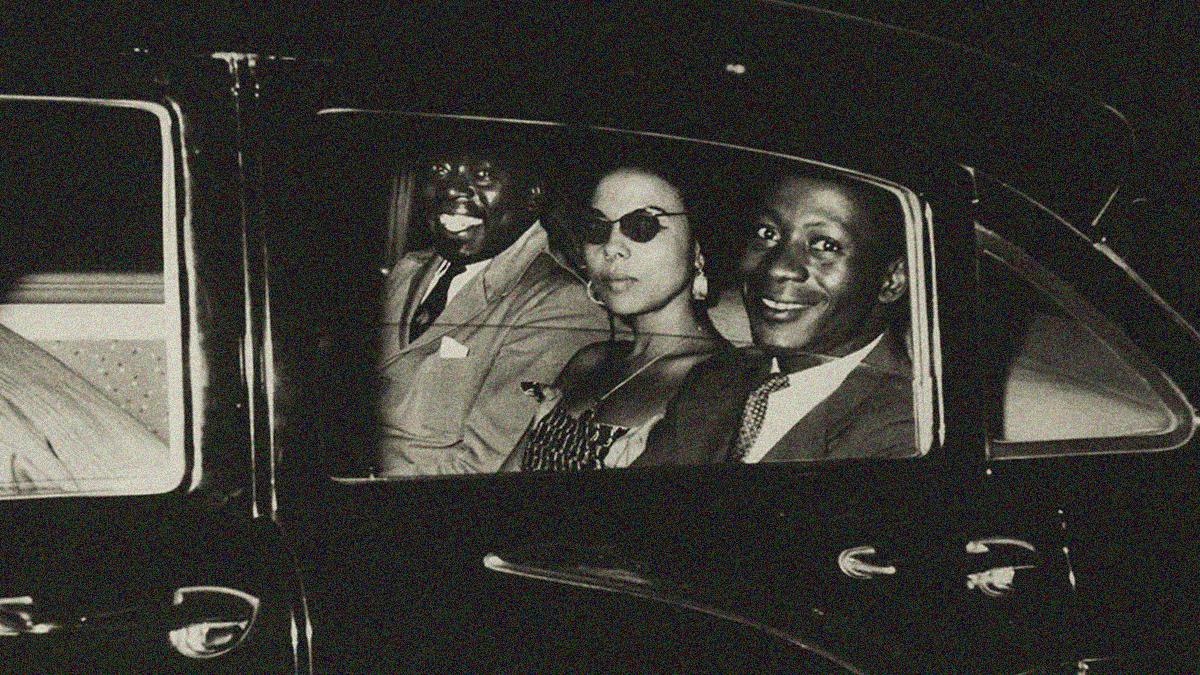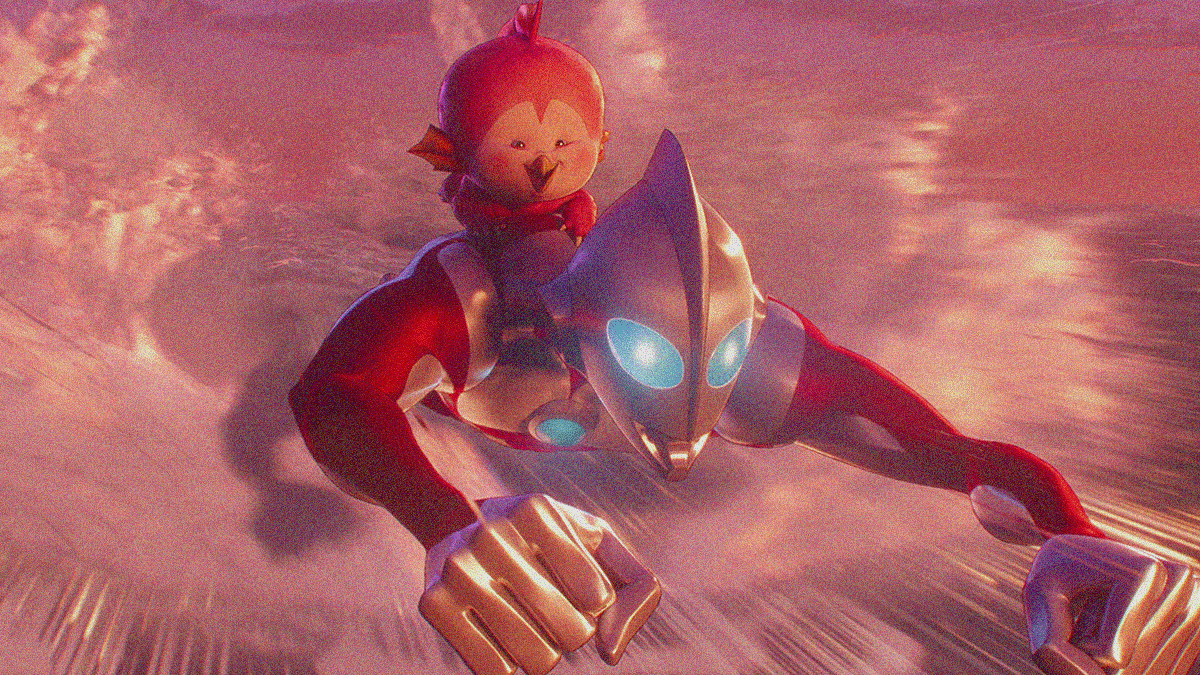The truncated window between theaters and streaming seems to be getting smaller and smaller these days—an unfortunate development for cinema, but a nice one for those hoping to catch-up early on Oscar contenders at home in the lead-up to the ceremony on March 2nd, 2025.
THE WILD ROBOT and CONCLAVE are now on Peacock. MARIA just hit Netflix. JOKER 2 is playing on Max with JUROR #2 joining on 12/20 and A24’s A DIFFERENT MAN on 1/17.
Add VOD with ANORA dropping on 12/17 and it’s truly crazy how much access we have. It used to be that you’d have to hope a local theater re-opened nominees in February because you’d still have to wait months for a sniff of at-home rentals. Kind of like A24’s SING SING hitting theaters for one week at the end of August, never being released digitally, and now getting held back for a second theatrical go-round on 1/17—leaving its digital status in the air.
I personally don’t mind either direction. I just wish it was consistent.
What I Watched:
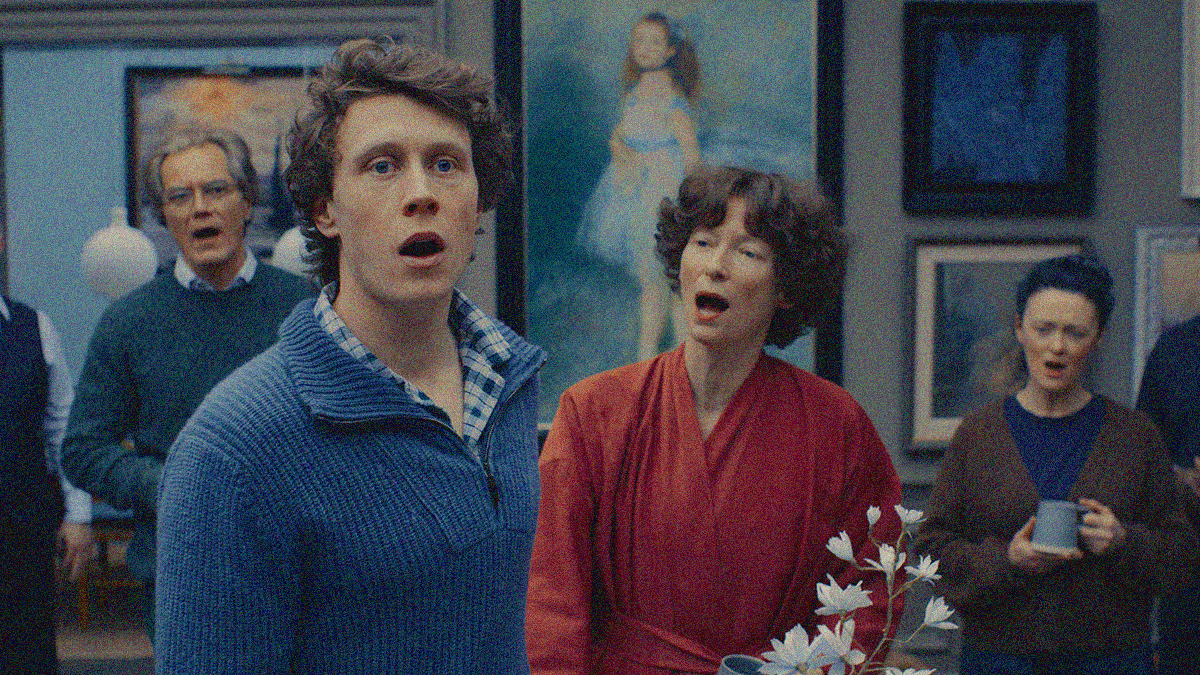
THE END
(in theaters)
There's no better audience than one that's never seen anything but the show. That's what George MacKay is to the other survivors living in this palatial bunker built by an energy magnate (Michael Shannon) and his dancer wife (Tilda Swinton). He is quite literally their entire world now that everything else is gone. So, why not feed him a more palatable version of themselves to better cope with their guilt and shame? Why not paint themselves as heroes for him to look up to and admire since there's no alternative with which to be compared anyway? Do it for long enough and you might even forget a different truth exists.
The point of Joshua Oppenheimer's musical The End (co-written with Rasmus Heisterberg) is that they must be reminded if only for us to perhaps prevent ourselves from following suit. How do you do that within a more or less hermetically sealed sanctuary (prison?) populated by those who need the lie to get up in the morning? By introducing someone new. Moses Ingram's entrance isn't an instant catalyst for this shift in perspective, but she does light their individual fuses by way of providing a glimpse into a mirror they thought they'd never look at again. Because she knows the "real world." She was born on the surface and has learned enough about history to know the plight of the poor.
It's a crucial distinction since MacKay's entire worldview was cultivated by his parents and their friends (Bronagh Gallagher's cook, Tim McInnerny's butler, and Lennie James's doctor). And since "energy magnates" are hardly heroes within mankind's descent towards extinction, you can imagine the disparity between what he thinks and what Ingram knows. MacKay is literally writing the book on his dad based upon the anecdotes he's told about being a man of the people and articles Shannon deems "true" (anything remotely critical that slips through is dismissed as propaganda). So, why wouldn't he believe workers loved their bosses? Or that working to the bone to bring an employer's desires to fruition was a point of pride rather than exploitation?
Worse than just this family's place in the annals of human history, however, are the decisions they made decades ago to maintain this specific mad house of fabricated happiness. That's the real danger that Ingram poses as an outsider. Not who she is or what she knows, but having the questions they ensured MacKay would never think to ask. Where's the rest of Shannon and Swinton's families? Why does Shannon seem to not understand what's happening when forced to confront something uncomfortable? Why does Swinton freeze as though she's been unplugged when forced to do the same? Just as Ingram thinks she must fill the cracks in the wall to stay, they all reapply the plaster they've smeared over the pain and emotions threatening to shatter their illusion.
It therefore makes sense to set it to music—giving these characters the room to breathe and feel that they refuse to supply themselves. I don't think it works every time, but I can't deny the effectiveness when it does (Shannon's "The Big Blue Sky" and Swinton's "The Mirror"). These interludes are fantasies that often cut to an entirely different set and moment wherein what occurred is erased. They are projections of what each wants to say but can't—dreams of honesty cutting through the reality of farce they've embraced as a survival mechanism. These are people who've created a false narrative to keep from succumbing to the pain of what they did or didn't do. And it's a thin enough veneer that MacKay doesn't need much to begin chipping away.
The result is long at two-and-a-half hours with many passages feeling redundant considering there are so few characters. The idea is that MacKay needs more time to fully be deprogrammed from what they've taught him despite us getting it straight away. Thankfully, the cast is fantastic and make those familiar moments shine through the small nuances separating one instance from the next. This is especially true when Gallagher and McInnerny get a brief second to earn the spotlight since they (along with James, who mostly exists in the background) are more about keeping up appearances for Shannon and Swinton than living for themselves within this creature comfort-filled museum hidden inside a salt mine miles below the fires that burn in perpetuity above.
And while MacKay and Ingram are very good as the driving force of this gradual awakening to the nightmare in which they're all trapped, Shannon and Swinton are the ones doing the heavy emotional lifting by letting the twenty-year-old masks they've forgotten were glued to their faces slip. Both deliver as many devastatingly sad flashes as funny ones due to the nature of pretending everything is all right even as they allow themselves the space to acknowledge something the other said is a blatant lie. These two lost souls are so enveloped in their own façade that the real horror of what's going on isn't that they should reckon with what they've done, but that they're probably correct to ignore it. Survival depends on their ability to pretend.
It's a truth I've started to accept the past few years as our species continues to destroy itself little by little with an individualist hunger that demands you put your own well-being above everyone else. My real terror isn't therefore born from the inevitable prospect of an early death. It's the notion that I might do something horrible enough to become one of the few who survive.
- 7/10
FROM – Season 3
(streaming on MGM+)
The teeth are back. Despite season two of "From" flowing better for me after a second viewing, my main gripe remained: it had lost the first season's edge. Yes, John Griffin and Jeff Pinkner did their best to tell us that the new danger was worse than the monsters in the forest, but the whole Freddy Krueger dreams coming true thing didn't have the same impact because it was isolating the fear. Everyone watching one person suffer meant they had to worry about what might happen to them too, but we as the viewers didn't. And when Julie (Hannah Cheramy), Mari (Kaelen Ohm), and Randall (A.J. Simmons) became the "three" from the nursery rhyme, the bigger picture disappeared completely.
Thankfully, that problem doesn't linger. Boyd (Harold Perrineau) smashed the music box and the whole plotline (worms and all after the bile bullets failed) is dropped. Season three begins back in the danger zone of the first and learns its lesson from the second by ramping up that original danger instead of trying to replace it. How? By giving the monsters agency. No longer are they just creatures of habit methodically roaming the streets to scare someone into letting them kill them. Now they are planning ambushes. They are leaving survivors. They are toying with the residents of this purgatorial town through life rather than just death. As Boyd explains, the talismans made it so people could pretend everything was okay during the day. Seeing reminders of the brutality walking around conversely ensures their horror lingers 24/7.
The result: a body count. That's honestly part of what made the initial season so memorable. Characters we assumed were leads died. No one was off-limits ... at least not to the extent where we couldn't fear for them. Sure, Boyd probably isn't going anywhere, but he is on a ticking clock regardless of this nightmare due to early onset Parkinson's. Griffin and company can milk that, but it still allows him to take risks in ways that make us wonder if maybe he won't survive. I don't think it's a coincidence then that Perrineau, Catalina Sandino Moreno, and Eion Bailey are the only actors with their own name card in the opening credits. It groups the others together without any hierarchy to both roll the dice on their individual salvation and make it so that the other three dying would truly pack a punch.
That's in the town, though. Anyone who watched the previous seasons knows that Tabitha (Moreno) got out. I was worried this development might split focus much by adding even more characters to the mix as she tries to save her family, but the writers on this season (it's not just Griffin and Pinkner this time) understood they couldn't do that again post-bus. Her escape is thus still more about the town than it is about the real world. It's about advancing the mythology to a place that officially exposes how this whole thing might have been planned out from the beginning. Because it's not just about connecting back to previous seasons. It's also about connecting season one and two in new ways through fresh mysteries that birth new questions. If the herd can be culled in the process of making that possible, all the better.
Interestingly, Boyd and Donna (Elizabeth Saunders) take a backseat here. Kenny (Ricky He) and Kristi (Chloe Van Landschoot) too. We begin to discover why it is Tabitha and Jade (David Alpay) keep seeing visions and they take the lead as far as pushing things forward (with the help of Bailey's Jim, even if he proves more of a pressure point than a helping hand). And since everything they see always comes back to Victor (Scott McCord), you'll be happy to know he gets multiple chances to shine as well considering he's ultimately the heart of this whole endeavor. Those three are at the center and the rest need to either get on-board or lose themselves to other subplots meant to ramp up the anxiety and paranoia of the others. Because this town's worst enemy is generally itself.
Some of those subplots can frustrate, though. Pegah Ghafoori's Fatima's trajectory has an interesting payoff, but I won't lie and say her story was the least interesting part. This is partially because it's connected to the music box layer of "this is so much scarier despite not being scary at all" and also because it turns her and Ellis (Corteon Moore) into shells of what made them captivate in the past. There's a point to having some familial drama that isn't just the Matthews (although that evolution works courtesy of Julie no longer caring about decorum around her parents), but it feels like it's working towards one specific thing straight from the start—just like it's actually doing. It exposes a new wrinkle that isn't too important in the grand scheme of things while also giving Elgin (Nathan D. Simmons) and Sara (Avery Konrad) something to do.
That's the juggling act with such a huge cast, though. Some things work better than others and, for me, the ones that do are the ones wrapped up in the fabric of the narrative rather than cool little asides. It's why I found myself waiting to get back to Tabitha, Jade, and Victor whenever someone else takes control. Randall and Julie do good to add some extra intrigue by acknowledging what happened in the second season when no one else really does by forcing themselves into that fabric despite it not initially seeming like they belong. What Julie discovers might end up being crucial to where the show goes next by reinventing the rules without writing over them. So, while some things end up feeling as though they occurred just to take us back to square one, it's mostly that way to ensure nothing distracts us too long from what truly matters.
- 7/10
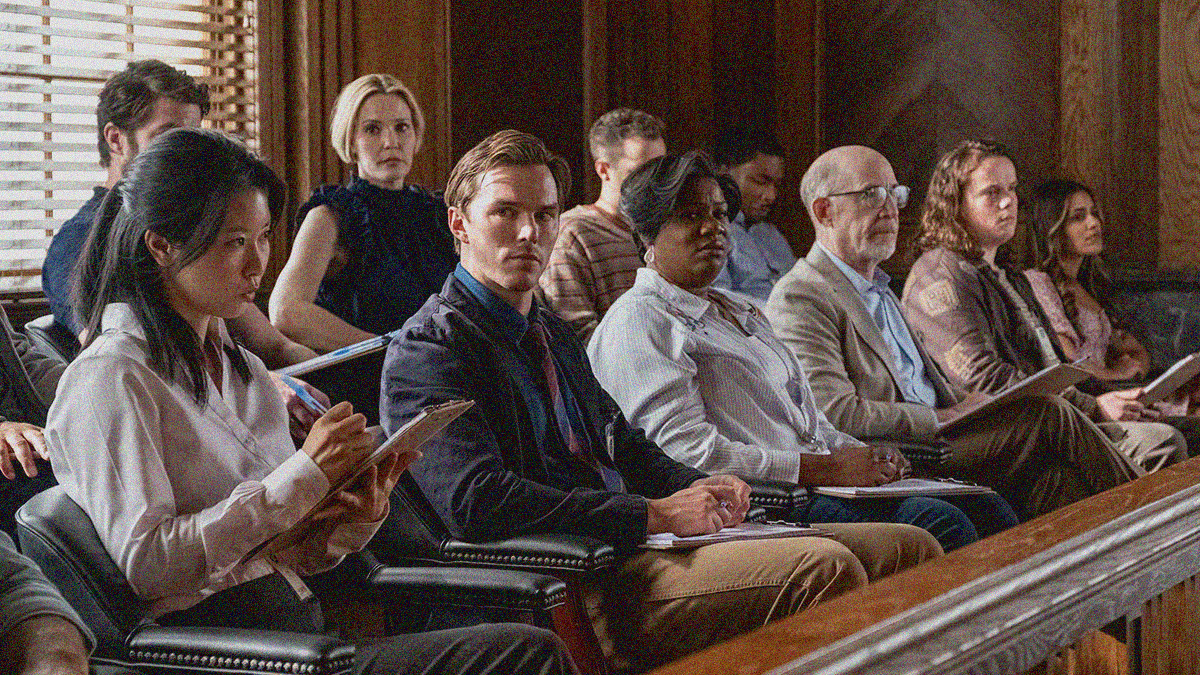
JUROR #2
(in theaters; streams on Max starting 12/20)
The plot of Clint Eastwood and screenwriter Jonathan A. Abrams' Juror #2 is fantastic. A man (Nicholas Hoult's Justin) trying to get out of jury duty to be with his wife (Zoey Deutch's Allison) at the tail-end of her high-risk pregnancy is chosen precisely because he doesn't want to serve. Thankfully, the murder trial (prosecuted by Toni Collette's Killebrew, favorite in the upcoming Attorney General election) is apparently open and shut: a man (Gabriel Basso's Sythe) killed his girlfriend (Francesca Eastwood) after a very public fight at a bar. Unfortunately, it's not until hearing opening statements that the details start to feel very familiar to Justin. Why? Because he was there. That's the night he hit what he presumed was a deer right around where they found the victim.
He should stop the trial and tell his side of the story, right? It was dark and stormy. Justin stopped the car, got out to search for whatever he hit, and ultimately saw the "deer crossing" sign directly in front of him. Why should he have assumed anything else? Why should anyone assume anything else? The damage to the car was minimal, so a deer could have simply run away. His line of thinking all makes perfect sense. At worst it's vehicular manslaughter if it's proven he hit this woman and he'll probably get off with probation. The main thing, of course, is that Sythe won't get life in prison for something it's beginning to seem like he didn't do. But there's one more wrinkle to this tale: the fact that Justin is an alcoholic and no jury would believe he wasn't drunk.
The film is thus a glimpse into just how complicated the "truth" can be when context is removed and preconceptions are made. The entire reason this case is deemed open and shut is because the world found Sythe guilty before the trial began. His past colors him a bad dude with temper issues and violent tendencies while all the circumstantial evidence points to him being the only person who had motive. Unless a truly awful hand of fate made it so the real perpetrator was an otherwise innocent man without motive who happened to be at the wrong place at the wrong time. To admit that, however, would risk the world finding Justin guilty before his own trial begins. And since neither is in the position of earning a fair shake, why shouldn't the "truth" become as malleable as their guilt?
It leads to some serious drama considering Justin seemingly controls the outcome. If he can convince the rest of the jury (consisting of Leslie Bibb, Cedric Yarbrough, J.K. Simmons, and others) to acquit, his conscience will be free as far as sending an innocent man to jail and he'll be able to go home to his wife and soon-to-be-born baby. It's a very fine line to toe, though, when questioning Sythe's guilt inherently means thinking about an alternative cause of death. The further they travel down that road, the greater chance he eventually puts the jury onto his own trail. The one thing he has going for him is that Killebrew needs this conviction to win her election. She won't let Sythe get away ... unless the public defender (Chris Messina's Resnick) is correct when he says his client is innocent. The longer deliberations go, the more she wonders if he is.
Juror #2 supplies one example of our imperfect system after another. Because if Sythe's trial is unfair, so would the next. The lawyers have agendas. The jurists do too with some wanting to go home to their kids, some wanting to stay entrenched so they won't have to go home, and others embracing the idea of handing out justice for past crimes regardless of today's guilt. Not even the witnesses are absolved from their part when they speak in absolutes that cannot feasibly be absolute. There are a lot of damning moments within this film (and inspiring ones considering some unlikely sources choosing to do right), but the one that sticks with me most is the star witness's face quickly turning from indignation to fear when asking, "He did do it, right?" days after declaring it under oath.
The stakes become two-fold as a result—and neither concerns Sythe since he tragically has zero control over his own future in this scenario. One follows the ruthless opportunist Killebrew and whether she'll grow a conscience to dig deeper and see the holes in her case are more than speculative. The other follows the compassionate Justin and whether his mounting guilt will finally push him to tell the truth regardless of the nightmare that would inevitably arise. She wants Sythe in jail until realizing she might have lost her way. He wants Sythe to go free until realizing that sacrificing himself might be the only avenue towards making it happen. Who blinks first? Or, and let's not pretend this isn't the more authentic result, perhaps neither will.
So, prepare to watch that night unfold multiple times. Through the eyes of witnesses. Through the vitriol of a prosecutor fighting for the victim's family. Through the fear of the defendant imploring the jury to believe him. Through the recontextualized memories of a man who must reckon with the fact he might be a killer. Hoult carries it all with an impressive ability to tap into his character's guilt in a way that has just as much chance of breaking him as it does embolden him. Collette supplies a nice contrast through her character's unwavering pragmatism and Yarbrough does the same via a depth of emotion that might be the most dangerous mirror on our society of the whole film. Justice is supposed to be blind, but those tasked with serving it rarely are.
- 8/10
THE LAST SHOWGIRL
(now in its Oscars-qualifying run; opens January 10, 2025)
For thirty years Shelly (Pamela Anderson) has been the face of Le Razzle Dazzle. Decades passed and her place within the revue diminished, but she's still wearing those giant wings as a centerpiece today. This performance is her life. Her everything. And now it's closing as new ownership in the casino that's been its home has decided to move to a more contemporary show instead. Coping is unsurprisingly a struggle—not just because it's her livelihood and artistic purpose, but also because losing it puts into perspective what it forced her to lose already. Maybe that clarity can help Shelly attempt to mend fences. Or, perhaps, it's too late.
Directed by Gia Coppola and written by Kate Gersten (partially based on her own unproduced play), The Last Showgirl utilizes the revue's final two weeks as a backdrop for aging, regret, and the earth-shattering price of naive optimism. Because while Jodie (Kiernan Shipka) and Mary-Anne (Brenda Song) have the objectivity and youth to realize Le Razzle Dazzle was no different than any of the other topless shows in Las Vegas, Shelly's craft and identity refuse to let her see it as anything but an iconic legacy piece that transcended whatever labels future generations have placed upon it. She must think that because the alternative is recognizing how those labels might also apply to her.
The time to evolve beyond it or escape from it has long since passed and there's a definite chicken and egg quality to the question of whether she stayed because it was great and she was great in it or because it was the perfect mediocre showcase for her adequate talents. Was she on the posters because of her dancing or her body? Did people come for the artistry or the breasts? Sure, Shelly is probably correct to say there's a level of empowerment to the whole thing ("That's why so many women come to watch."), but that doesn't negate the reality that most of the girls on that stage are there for the paycheck. And even that is under protest since this career isn't working towards a comfortable retirement (ask Jamie Lee Curtis's Annette).
While reevaluating the job and its merits is one thing, however, reconciling everything she gave up to stay the course is another. Shelly talks about being married before he moved to New York without her because she decided to stay after too many failed auditions there. There's barely scraping by on lemons because she never had the opportunity for a pension (like Dave Bautista's show manager Eddie) or a "501k" (as Annette calls them). And, of course, there's Hannah (Billie Lourd) her estranged daughter—the one she supported because of the show and the one who believes she picked that show over her. That's the reason she's never seen the final product. Not because of its questionable content, but because discovering it isn't good would only make things worse.
The film feels like a play, so it's no surprise that it partially started as one. It does a good job using the other characters to gain insight into Shelly (how she treats Jodie when the latter is looking for a mother figure or how Annette plays like a tragic mirror into her own future), but it can come off as being thin since those moments ultimately speak for themselves before disappearing for the next stepping-stone towards a necessary sense of self-awareness that sadly might be coming too late. That's a critique you cannot give Anderson in the lead role, though. Hers is a three-dimensional performance that has her tapping into our preconceptions of her celebrity as well as her own regrets born from its hold on her to deliver a beautifully confident, soul-searching, and cathartic masterclass of authenticity.
- 7/10
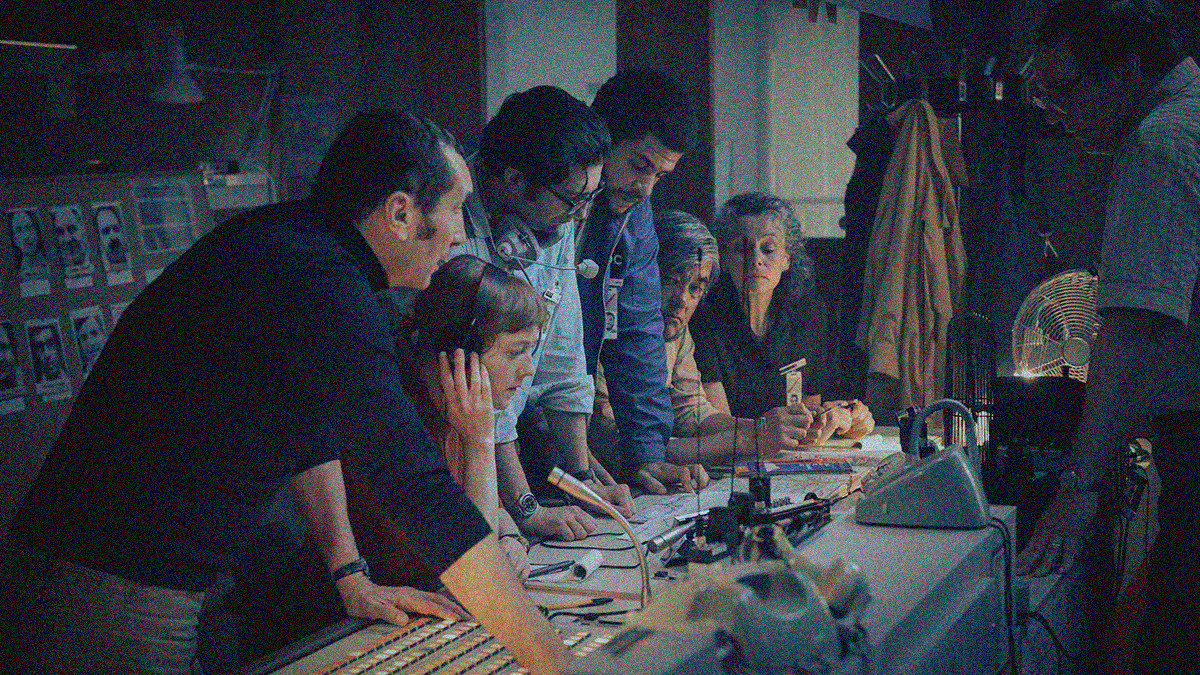
SEPTEMBER 5
(limited theaters; wide on January 17th, 2025)
It's wild to think that the mess we're in as far as broadcast reportage becoming more about ratings than facts is a result of an ABC sports crew working one of the biggest news events in international history. Yes, things got really bad when for-profit news channels and organizations made it so editorializing became synonymous with truth simply because the entertainment value lured viewers from the staider reality of objectivity, but the tragic hostage situation that occurred during the 1972 Munich Olympics paved the way. Why? Because it was live. And what does the uncertain immediacy of live television foster? Mistakes.
I'm a sucker for a good process film and Tim Fehlbaum's September 5 (co-written by Moritz Binder) delivers a great one. Not only because it's a tense affair that approximates Roone Arledge's (Peter Sarsgaard) goal of "following the story," but also because it presents those moments of spontaneous ingenuity and fallibility that arise from a situation that had never occurred before. That it was a sports team handling it was thus a major boon for the format (who better to understand the energy and emotion of a battle unfolding in real-time) and perhaps the worst thing possible for the sanctity of truth. Sports is all about speculation and commentary, after all. You report on what you see and contextualize it after.
The chaos is obvious when you're teaming Peter Jennings (Benjamin Walker) hiding in the Olympic Village after everyone else was evacuated with Howard Cosell reporting from an underground parking garage. Arledge, Marvin Bader (Ben Chaplin), and the green Geoffrey Mason (John Magaro)—who ultimately took point—were forced to utilize every resource at their disposal regardless of whether it was in their current wheelhouse. A studio camera is wheeled outside for a live angle. Gary Slaughter (Daniel Adeosun) is dressed to impersonate an athlete for unfettered access between Jennings and the control room. And German translator Marianne Gebhardt (Leonie Benesch) is deputized as Mason's eyes and ears on-the-ground. They can only pray the ordeal gets resolved ... and hope they capture every second.
I love the little moments born from necessity. Technological fixes like superimposing the ABC logo on the camera before allowing CBS to broadcast their feed or wiring a telephone to go live on the air in under sixty minutes. Moral quandaries like Roone and Marv arguing about whether they should ask an Israeli athlete what it means to win a medal on German soil pre-attack and then whether they should keep the cameras rolling if a Black September terrorist murders an Israeli athlete on live TV. And, of course, weighing the desire to be first on every single development against the policy of needing three sources for confirmation. These aren't easy scenarios to wade through—especially not when you only have seconds to come up with an answer.
What September 5 does best, however, is reveal the slippery slope that's been all but buried under an avalanche in the decades since. Because even those fighting on the side of decency and compassion at the start of the day quickly get caught in the rush of the moment. Sure, ratings are always top of mind, but I'm simply talking about capturing and releasing footage of a terrorist attack to the world as it's happening. Mason and company get so wrapped up in the excitement and artistry of their accomplishments that they completely forget about the potential ramifications of those actions. Being able to watch as German police enter the hotel for an offensive is revolutionary—but it's also dangerously irresponsible upon recognizing that the terrorists are watching too.
Therein lies the inherent commentary on display despite the film itself running pretty apolitically from start to finish (placing the neutrality of good journalism front and center). While Mason, Bader, and Arledge ultimately do make mistakes, they did not have the experience necessary to prevent them. They are sometimes quick to embrace the mental gymnastics they believe will absolve them from responsibility if things go poorly, but you can't really blame them since they also have the wherewithal to question what they're doing. Put them in the same situation tomorrow, though, and all bets are off since protocols will have been instated, debates fought, and liability defined.
And yet, as evidenced by the dereliction of duty that often passes for objective journalism today, it seems the industry learned all the wrong lessons. They learned how to bend those protocols, dismiss those debates, and manufacture loopholes out of liability (or simply have the money to not care). They saw the effectiveness of the visual language of live sports and made it so the culture of celebrity criminals, ambitious reporters, and clout-chasing influencers would replace the integrity of a trained professional. Here they were considering what it would mean for the families of the hostages to watch their children die and here we are scrolling our social media feeds to find every angle imaginable of the most heinous horrors you can imagine. We wonder why we've gone numb.
This is where it started. Ground zero. Arledge leveraging his unique position to strong-arm competitors for airtime. Mason gradually losing his wider appreciation for the moment in service of that bloodlust desire to "get the shot." The ease at which people can dress-up their language to lie without technically presenting that lie as truth. It's a damning display of our impulse to move the line and yet also a laudable depiction of trendsetting men and women operating at en extremely high level in impossible circumstances. I'll even go so far as say it was nice and inspirational to again be able to have respect for people in the media doing their best regardless of whether it doesn't prove enough. Because we used to believe they'd learn the lesson. Now we know they'll just exploit it.
- 9/10
SOUNDTRACK TO A COUP D’ETAT
(limited release)
Since the Eisenhower administration used jazz performers like Nina Simone and Louis Armstrong as a smokescreen to infiltrate Africa for their own nefarious interests (labeling them "ambassadors" and selling them as evidence of a "free nation" in contrast to so-called communist leanings via de-colonization), Johan Grimonprez seeks to reclaim their music by using it as a soundtrack to the truth of that time instead. Because as Malcolm X orates, Black Americans were citizens without citizenship. They were prisoners to a system that sought to pretend like it cared about African rights despite the hypocrisy because all it really craved was access to the Democratic Republic of the Congo's crucial mineral deposits.
So did the rest of Europe. Especially Belgium, the country that "agreed" to give the DRC independence ... after first privatizing its most profitable mine and covertly installing its own people in new Prime Minister Patrice Lumumba's cabinet. Everything that follows is therefore the collusion of world powers undermining their front-facing efforts to give Africa back to Africans by ensuring it gets accomplished on their terms. Cue the assassination plots. Cue the coups. Cue the subtle nudges necessary for intelligence officers to keep their hands clean while getting these countries to do all the dirty work themselves. If Lumumba is too popular and smart to play ball, they'll back President Joseph Kasa Vubu instead. And, just in case, they'll activate General Joseph-Désiré Mobutu too.
Soundtrack to a Coup d'Etat lays it all out in enthralling fashion via the words of those involved. We hear from Lumumba's close advisor Andrée Blouin's personal papers. There's Nikita Khrushchev's recorded diaries. Novelist In Koli Jean Bofane reads from his novel and provides a first-hand account of his own harrowing experience. And Irish diplomat Conor Cruise O'Brien rounds things out with insight into what went on during those first seven months of DRC independence. Add the music (Simone, Armstrong, Dizzy Gillespie, and the duo of Abbey Lincoln and Max Roach, who protested at the UN with Maya Angelou after Lumumba's inevitable death), speeches (Malcolm X and many United Nations ambassadors), and archival interviews (including CIA Director Allen Dulles) and Grimonprez has every angle covered.
It plays as a rousing history lesson the likes of which we may not see any more considering all the stories of teachers dealing with students using generative AI as a search engine to fabricate bespoke wrong answers to their questions. The way Grimonprez weaves it all together with evidence of just how deep America, Belgium (his homeland), the USSR, and others were in this neocolonial period is enlightening. His ability to also keep it kinetic with the jazz backdrop, damning text quotes, and visual callbacks for two-and-a-half hours is impressive. He takes us back a couple years before DRC independence to set the stage in Africa and the UN, lets Lumumba win us over with an unwavering dedication to his people, and simply allows Eisenhower, et al. to villainize themselves.
And despite the DRC being the focus with the whole bookmarked by Lincoln and Angelou's coordinated crashing of the UN Security Council, the story is so much bigger than one country. It's why Grimonprez consistently goes back to archival footage talking about the DRC being the "key to Africa" and why he splices in a Tesla and Apple commercial to remind us of the reason. Between Egypt nationalizing the Suez Canal and Ghana and Guinea working towards building a United States of Africa, Lumumba's potential to actually make the DRC into a world power by keeping its vast wealth for itself was a bridge too far (and the bridge the West could detonate without much fallout). Cue the interviews with mercenaries. Cue the poison ice dart. Cue the smug smiles and "no comments." Peace does not pay.
- 8/10
ULTRAMAN: RISING
(streaming on Netflix)
Mom (Tamlyn Tomita's Emiko) was a scientist and die-hard baseball fan—even if she rooted for the "wrong" team. Dad (Gedde Watanabe's Professor Sato) was a scientist and ... Ultraman—Japan's famed hero against a continuous onslaught of destructive kaiju. To therefore ask young Kenji (Hiro Nakamura) which he'd prefer growing into isn't a fair question since it inherently creates a rift in the family regardless of whether the choice proves a rejection of the other or merely a decision in spite of it. All he wants is to be seen and loved by his parents. Baseball. Ultraman. None of it mattered as long as Mom and Dad tucked him in at night.
Well, as Shannon Tindle's (co-written with Marc Haimes and co-directed with John Aoshima) fresh adaptation of Eiji Tsuburaya's character Ultraman: Rising shows after fast-forwarding a few decades, that didn't end up the case. Because in order to protect his family, Sato sent them to America while he stayed behind to fight without needing to also worry about their well-being. While obviously a difficult decision and one that Ken (Christopher Sean) would grow to resent as he ultimately chose baseball, his parents never regretted it since it allowed him to grow up safe and become a superstar. The problem was that splitting up their team meant he felt alone enough to spurn all future teams.
So, his return to Japan (requested by his mother upon learning his father could no longer physically serve as Ultraman) is dripping in ego and hubris. Ken agrees to take up the Ultraman mantle, but not at the expense of his career—leaving the Dodgers in Los Angeles to join the Giants in Yomiuri. The Americanized confidence and individualism he's cultivated says he can do it all sans help. Win a championship regardless of his teammates and coach. Save the day without asking his father for advice (or speaking to him at all). This is the "lesson" he took from his youth. A fend for yourself attitude because those you love always leave rather than the selfless reality of having to leave so nobody dies.
Well, it goes as one would expect: poorly. On both ends. More than an action-adventure between hero and monster, Ultraman: Rising becomes just what the title describes. It's about Ken's evolution as a man first, athlete and super-powered star second. It's about learning what it means to take responsibility for another living soul beyond oneself—a lesson taught through the unplanned adoption of an infant kaiju he cannot bring himself to abandon. Because Ken's father never killed these mammoth beasts. He merely drove them away. It's only when Dr. Onda's (Keone Young) Kaiju Defense Force is created that murder is sanctioned above suppression. Leave this helpless creature to them and its dire fate is all but decided.
The result has many similarities to How to Train Your Dragon as far as rewiring one's brain to the truth that things aren't so black and white. Just because something scary seems to be attacking doesn't mean it's not simply defending itself from your attack and vice versa. While it's one thing to try and defuse a kaiju's attack before Onda satisfies his bloodlust (a mindset one can empathize with while still refusing to condone), however, it's another to raise one. With help from Emiko's AI (Mina, also voiced by Tomita), he does his best at the detriment of his performance on the diamond. Only when he mends the fractures in his existing family can he hope to fully embrace the new one he's building.
There are other mysteries teased at the end and during a mid-credits sequence to be fodder for potential sequels (the whereabouts of Ken's mother and the so-called "Kaiju Island"). There are hints at a possible romance with sports reporter Ami Wakita (Julia Harriman) that are currently steeped in friendship and support. And a lot of anime-infused battles between humans and kaiju as well as humans and humans depending on who we currently understand the "monster" to be. It's a fun journey with important themes that never talks down to its audience and an emotionally mature look at familial structures and the danger of letting one's hurt dictate their actions. Add the cutest little fish-bird-dragon amalgam at the center and it's hard not to buckle in and enjoy the ride.
- 8/10
Cinematic F-Bombs:
This week saw BEETLEJUICE BEETLEJUICE (2024), THE CAINE MUTINY COURT-MARTIAL (2023), and TRANSFORMERS: DARK OF THE MOON (2011) added to the archive (cinematicfbombs.com).
Michael Keaton dropping an f-bomb in BEETLEJUICE BEETLEJUICE.
New Releases This Week:
(Review links where applicable)
Opening Buffalo-area theaters 12/13/24 -
THE END at North Park Theatre
Thoughts are above.
KRAVEN THE HUNTER at Dipson Flix & Capitol; AMC Maple Ridge & Market Arcade; Regal Elmwood, Transit, Galleria & Quaker
THE LORD OF THE RINGS: THE WAR OF THE ROHIRRIM at Dipson Flix & Capitol; AMC Maple Ridge & Market Arcade; Regal Elmwood, Transit, Galleria & Quaker
THE MAN IN THE WHITE VAN at Regal Elmwood, Transit, Galleria & Quaker
QUEER at Dipson Amherst; Regal Elmwood
Streaming from 12/13/24 -
CARRY-ON – Netflix on 12/13
CONCLAVE – Peacock on 12/13
“The result is extremely entertaining even if the stakes are never as high as the film believes. [And] the silliness is fun until it's just plain silly.” – Full thoughts at HHYS.
DAHOMEY – MUBI on 12/13
“It's a powerful account of just how complex the concept of colonialism remains and how its hold on freed nations doesn't automatically disappear via independence.” – Full thoughts at HHYS.
DISASTER HOLIDAY – Netflix on 12/13
ELTON JOHN: NEVER TOO LATE – Disney+ on 12/13
JOKER: FOLIE À DEUX – Max on 12/13
CARNAGE FOR CHRISTMAS – Shudder on 12/15
“A lean, melodramatic tale of returning home to discover the people who thought they were better than you are the losers you always knew they were.” – Full thoughts at The Film Stage.
CUCKOO – Hulu on 12/17
“The nightmare itself is worth a look. The story surrounding it isn't perfect, but something in its messiness works considering the emotional impact comes from grief and despair.” – Full thoughts at HHYS.
JULIA’S STEPPING STONES – Netflix on 12/18
Now on VOD/Digital HD -
THE BEST CHRISTMAS PAGEANT EVER (12/10)
BLACK CAB (12/10)
HERETIC (12/10)
“Credit the strength of Grant's performance too—a fork-tongued vaudeville act meant to distract us as much as his victims. HERETIC might not be as smart as it thinks, but boy is it fun.” – Full thoughts at The Film Stage.
IT’S NOT ME (12/10)
“Gives shape to [Carax's] ideas and influences while paying homage to the artists who inspired and assisted in the art he's made.” – Full thoughts at jaredmobarak.com.
THE ROUNDUP: PUNISHMENT (12/10)
“This one might be the tamest so far (I still haven't seen THE OUTLAWS), but it's still a lot of fun. Park Ji-hwan steals the show. Kim Mu-yeol is brutally menacing. And Don Lee is having a blast.” – Full thoughts at HHYS.
VENOM: THE LAST DANCE (12/10)
THE ACTIVATED MAN (12/13)
DAHOMEY (12/13)
“It's a powerful account of just how complex the concept of colonialism remains and how its hold on freed nations doesn't automatically disappear via independence.” – Full thoughts at HHYS.
DIRTY ANGELS (12/13)
FROM EMBERS (12/13)
RESYNATOR (12/13)
SCRAP (12/13)
“It's an important message told with a wealth of empathy that never disappears even as Beth spirals deeper and deeper into depression and denial. It's also an honest portrayal of desperation.” – Full thoughts at HHYS.
YOUNG WERTHER (12/13)





